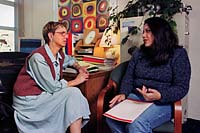

|
AFFORDABILITY
While research has its own reward, It's a win-win combination: The Madison Initiative is making it possible for undergraduates to explore new worlds through university research – and help pay their college costs to boot. ONCE OPEN ONLY TO professors and graduate students, today more and more undergraduates are encountering the fascinating world of university research. Approximately 10 percent of the university's 28,000 undergraduates are involved in some sort of research opportunity or creative activity. This new trend, which allows beginning students valuable hands-on experience, also paves the way toward helping pay for college. Providing undergraduates with research opportunities that help cover college costs is a priority under the Madison Initiative. Funding from the initiative will enhance several programs that help pay tuition for qualified students, such as undergraduate research fellowships, internships and merit-based scholarship programs. Madison Initiative funding also will provide all students who receive need-based financial aid with grants to offset the extra tuition that is helping support the public-private partnership. One undergraduate who has benefited both academically and financially from research opportunities is Luz Adriana Torres. A first-generation college student who is the daughter of Mexican parents, Torres spent her freshman and sophomore years working on a Medical School research project. Torres worked with faculty members who are conducting research on how to stretch and lengthen bones. The research is designed to reduce the time and severity of surgeries involving plastic surgery and facial reconstruction for patients with cleft palates. "Working on that project taught me how to be more patient, and it also taught me that the results don't always come out as you planned," says Torres, a junior from San Antonio, Texas. This past spring, Torres worked on another Medical School research project testing the efficacy of steroids. Using rats, Torres and others measured how well the steroids reduce swelling for head and neck injuries, which can cause respiratory problems during surgery. Torres was one of the 15 students in the inaugural class of the Undergraduate Research Scholars Program, which began two years ago. The program has now grown to 65 research scholars and 10 peer mentors, upper-class students who provide direction and support for the scholars, says A. Margaret Elowson, URS program director. URS students meet in seminars to learn about the university's research culture, ethics, interpersonal communication and how to effectively share information about their research. The URS program grants credits for students' research experiences and prepares them to compete for research fellowships and scholarships. "We want to change the culture, so that having first- and second-year undergraduates engaged in research is the norm rather than the exception," says Elowson. Torres' experience enabled her to land a spot in the prestigious McNair Scholars Program, funded by the U.S. Department of Education and the UW-Madison Graduate School. Named after Ronald E. McNair, the second African-American to serve as a U.S. astronaut, the program prepares undergraduates to obtain doctoral degrees in the biological and physical sciences, as well as business, engineering, mathematics and psychology. Students are selected for the McNair Scholars Program in their junior and senior years, and must be low-income, first-generation college students or members of an underrepresented group or ethnicity in graduate education. Through the McNair Program, Torres is receiving a $500 stipend per semester, and another $500 stipend if she is actively working on a research project. McNair Scholars also receive at least $2,500 while participating in a summer program for eight to 10 weeks. The scholars also receive fee waivers for graduate program applications. Torres says the financial support has been a big help. "Because of the stipend, I have not had to get a part-time job, so I can focus on my studies and hopefully give back someday to my community," says Torres, who is considering biology for a major and a future career as a scientist or possibly a medical doctor.
|

Doing research teaches you to expect the unexpected, says Luz Adriana Torres, right, who worked on a medical research project during her freshman and sophomore years. A. Margaret Elowson, left, directs the Undergraduate Research Scholars Program, which has grown to 65 research scholars and 10 peer mentors.
Related links: Undergraduate Research Opportunities |
|
Table of contents | Chancellor's special reports | UW Home | Feedback |
|
|